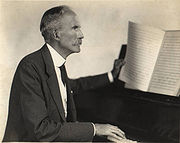
Ernest Trow Carter
Encyclopedia

Organist
An organist is a musician who plays any type of organ. An organist may play solo organ works, play with an ensemble or orchestra, or accompany one or more singers or instrumental soloists...
and composer
Composer
A composer is a person who creates music, either by musical notation or oral tradition, for interpretation and performance, or through direct manipulation of sonic material through electronic media...
.
Biography
He was born on September 3, 1866 in Orange, New JerseyOrange, New Jersey
The City of Orange is a city and township in Essex County, New Jersey, United States. As of the 2010 United States Census, the township population was 30,134...
to Aaron Carter and Sarah Swift Trow. At age seven, in 1873 he started eight years of study of piano and harmony, with Mary Bradshaw. At age thirteen he organized an amateur orchestra, studied the cornet, was assistant conductor of the school orchestra; and at sixteen he was playing cornet in a professional orchestra.
He graduated from Princeton University
Princeton University
Princeton University is a private research university located in Princeton, New Jersey, United States. The school is one of the eight universities of the Ivy League, and is one of the nine Colonial Colleges founded before the American Revolution....
, cum laude, in 1888, and while there he became leader of the Glee Club and Chapel Choir. He composed Princeton's "Steps Song" and arranged much of the music sung by the glee club
Glee club
A glee club is a musical group or choir group, historically of male voices but also of female or mixed voices, which traditionally specializes in the singing of short songs—glees—by trios or quartets. In the late 19th Century it was very popular in most schools and was made a tradition...
. He also studied piano with William Mason and singing with Francis Fisher Powers. He studied the French Horn with Hermann Hand of the New York Symphony Orchestra
New York Symphony Orchestra
The New York Symphony Orchestra was founded as the New York Symphony Society in New York City by Leopold Damrosch in 1878. For many years it was a fierce rival to the older Philharmonic Symphony Society of New York. It was supported by Andrew Carnegie who built Carnegie Hall expressly for the...
. He then received a Master's Degree
Master's degree
A master's is an academic degree granted to individuals who have undergone study demonstrating a mastery or high-order overview of a specific field of study or area of professional practice...
from Columbia University
Columbia University
Columbia University in the City of New York is a private, Ivy League university in Manhattan, New York City. Columbia is the oldest institution of higher learning in the state of New York, the fifth oldest in the United States, and one of the country's nine Colonial Colleges founded before the...
.
He went to California in 1892 as musical director of the Thacher School. In 1894, he went to Berlin where he studied composition with Royal Music Director Wilhelm Freudenberg, composer and director of opera, and with O. B. Boise; and organ with Arthur Egidi.
He returned to New York around 1898, and studied organ with Homer N. Bartlett. From 1899 to 1901 he was lecturer on music, organist and choirmaster, at Princeton University
Princeton University
Princeton University is a private research university located in Princeton, New Jersey, United States. The school is one of the eight universities of the Ivy League, and is one of the nine Colonial Colleges founded before the American Revolution....
. He then resigned, and devoted his time to composition and singing. For one year he sang in the chorus of the Metropolitan Opera Company.
He died on June 22, 1953 after a long illness at Wallick Point in Stanford, Connecticut.

